Supplements for performance: which ones have merit?
Read more about the evidence for safe and effective supplement use in sports to provide better care to patients in the athletic space.

HealthCert Education
In the world of sports supplements, there’s plenty of different products out there with all sorts of claims on improving performance – which can be quite overwhelming for anyone to try to navigate. While many don’t hold up to their claims, there are several supplements that do have research to back them up.
The following performance supplements have been classified as “Group A” by the Australian Institute of Sport and have strong evidence for certain applications in sport to support or enhance performance [1].
Learn more about medical nutrition for sport performance in the HealthCert Professional Diploma program in Medical Nutrition Management - online nutrition training for GPs.
Caffeine
While we’re all likely familiar with the personal benefits we gain from caffeine, it is also widely studied to be beneficial from a performance perspective. Caffeine is thought to mainly work by exerting effects on the central nervous system, lowering perceived level of fatigue [2]. Caffeine has been consistently shown to enhance exercise performance when consumed in doses of 3-5mg per kg of body mass, and the most consistent benefits have been shown for aerobic endurance [3].
Although caffeine may improve performance, it may not be for everyone as people react differently to caffeine. Some individuals have increased sensitivity, and it can exacerbate anxiety. It’s also worth noting that caffeine has a long half-life and can negatively impact both sleep quality and recovery!
Beta alanine
Supplementation of beta alanine has been shown to increase muscle carnosine, which acts as an intracellular pH buffer. Research shows that supplementation may improve high intensity endurance high exercise, having a significant effect overall on exercise capacity and performance [4].
Creatine
Creatine is one of the most studied supplements for both professional and recreational athletes wanting to improve performance. It’s naturally found in most meat products, and so vegetarians are likely to have reduced stores and may particularly benefit from supplementation [5].
Studies consistently demonstrate that creatine supplements can enhance performance by increasing phosphocreatine stores, allowing an individual to generate ATP quicker and back-up sets better [6]. This is particularly useful for exercise that requires repeated sprints or repeated high intensity exercise that has short recovery in between [6]!
Glycerol
Glycerol is found as a component of dietary fats. Research shows that it may be beneficial for achieving pre-exercise hyperhydration through retaining ingested fluids, helping athletes improve hydration status [7]. This may be particularly beneficial for athletes that undergo intense exercise where either access to fluid is limited or there are increased fluid losses due to the environment.
Dietary nitrates
Dietary nitrates, found in a high concentration in beetroot juice and other vegetables, increase the availability of nitric oxide in the body. This can impact the amount stored in the blood, muscles and other organs which in turn can improve blood flow and increase oxygen to muscles, which may help improve performance.
In fact, research has found that both long-term and short-term intakes of beetroot juice can increase exercise capacity and sports performance [8]. Supplementation may be particularly beneficial for recreationally active individuals rather than athletes who have excellent aerobic fitness [9].
Sodium bicarbonate
During long periods of exercise, muscles can produce an excess amount hydrogen ions. As bicarbonate is important for the body’s pH buffering system, supplementation may help to match energy demand during exercise and has been shown to increase performance measurements during high intensity exercise [10].
Supplements are widely consumed among the general population, including athletes and active individuals. By developing an in-depth understanding of the evidence on supplement use in sport, GPs can provide better care to those in the athletic space when choosing both safe and effective supplements.
Learn more about this topic in the online Professional Diploma program in Medical Nutrition.
- Sarah Marko, Accredited Practising Dietitian
References
[1] Australian Institute Of Sport. Australian Institute of Sport Position Statement Supplements and Sports Foods in High. Suppl Sport Foods High Perform Sport 2021
[2] McLellan, T., J. Caldwell, and H. Lieberman. (2016). A review of caffeine’s effects on cognitive function, physical and occupational performance. Neuroscience and Biobehavioral Reviews, 71, 294-312.
[3] Guest NS, VanDusseldorp TA, Nelson MT, Grgic J, Schoenfeld BJ, Jenkins NDM, et al. International society of sports nutrition position stand: caffeine and exercise performance. J Int Soc Sports Nutr 2021. https://doi.org/10.1186/s12970-020-00383-4.
[4] Saunders B, Elliott-Sale K, Artioli GG, Swinton PA, Dolan E, Roschel H, et al. β-Alanine supplementation to improve exercise capacity and performance: A systematic review and meta-Analysis. Br J Sports Med 2017. https://doi.org/10.1136/bjsports-2016-096396.
[5] Kaviani M, Shaw K, Chilibeck PD. Benefits of creatine supplementation for vegetarians compared to omnivorous athletes: A systematic review. Int J Environ Res Public Health 2020. https://doi.org/10.3390/ijerph17093041.
[6] Kreider, R. B., Kalman, D. S., Antonio, J., Ziegenfuss, T. N., Wildman, R., Collins, R., Candow, D. G., Kleiner, S. M., Almada, A. L. & Lopez, H. L. (2017). International Society of Sports Nutrition position stand: safety and efficacy of creatine supplementation in exercise, sport, and medicine. J Int Soc Sports Nutr 14: 18.
[7] McCubbin AJ, Allanson BA, Caldwell Odgers JN, Cort MM, Costa RJS, Cox GR, et al. Sports Dietitians Australia position statement: Nutrition for exercise in hot environments. Int J Sport Nutr Exerc Metab 2020. https://doi.org/10.1123/ijsnem.2019-0300.
[8] Jones, A. M., Thompson, C., Wylie, L. J., & Vanhatalo, A. (2018) Dietary Nitrate and Physical Performance. ARN, 38, 303-328
[9] Senefeld, J. W., Wiggins, C. C., Regimbal, R. J., Dominelli, P. B., Baker, S. E., & Joyner, M. J. (2020). Ergogenic Effect of Nitrate Supplementation: A Systematic Review and Meta-analysis. Med Sci Sport Exerc, 52, 2250-2261.
[10] Siegler JC, Marshall PWM, Bishop D, Shaw G, Green G. (2016). Mechanistic insights into the efficacy of sodium bicarbonate supplementation to improve athletic performance. Sports Medicine – Open, 2, 41.

 1800 867 1390
1800 867 1390





